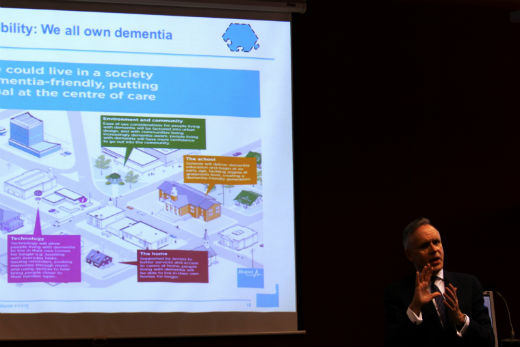A leading authority in dementia care says more needs to be done to raise awareness and understanding of the disease.
Bupa global director of dementia care Professor Graham Stokes the keynote speaker at a conference on dementia says Rotorua showed their desire to create a dementia inclusive community with the large number of people turning up to listen on Wednesday at the council.
Professor Graham Stokes talking at Wednesday's conference on Dementia in Rotorua. Photo: Supplied.
Rotorua Mayor Steve Chadwick also met with Graham where they discussed the civic responsibility 'so we all own dementia and can support those living with the disease”.
The talk hosted by Rotorua Lakes Council and Bupa saw more than 100 people from the community.
'It is great to hear 100 people came from the wider region because it is very special when we get someone like Prof Stokes to come and talk in our community,” Steve says.
Graham says more needs to be done to raise awareness and understanding of dementia – a disease that is set to double in the next 35 years.
Supporting people living with dementia in the community starts with understanding the challenges.
It takes everyone to make a difference from education in schools, environment design in supermarkets to workplace training – to support people living with dementia.
'It's often the very simple things we can do, understanding the families who are going through this phenomena, understanding the rates of dementia which are growing very very rapidly in all communities and then knowing how we should be making ourselves fit for purpose for a future where a lot of people with dementia will remain in their own homes,” Steve says.
'Hospitalisation is not the answer for these people. We need to understand what dementia is about and understand the progress of dementia for patients and sufferers and then their families.”
With ageing populations worldwide and the numbers of people living with dementia set to rise everywhere, dementia truly is a global challenge Steve says.
By 2050, 147,359 New Zealanders will have dementia – more than 2.6 per cent of the population, and more than triple the current numbers. Of the total, 87,145 (59 per cent) will be female and 60,214 (41 per cent) male. Annual incidences (onset) of dementia will also more than triple, to 41,088 new cases by the year 2050.
'It was delightful to meet Prof Graham Stokes and to have him come and speak in our community about the impact of dementia on both sufferers and their family members and what we could start to consider if we were going to ever be a dementia friendly community,” Steve says.
Graham is the Global Director of Dementia Care at Bupa, an author and clinician who is also an internationally recognised authority on dementia care practice and policy, clarifies the current situation.
'People are living longer and countries having to cope with rapidly ageing populations. At the moment, only around half of people living with dementia in high-income countries actually get a diagnosis.
'In developing countries, it's only around 10 per cent. While these numbers should improve slightly in the next few decades, the reality is that countries with emerging economies will have huge numbers of people living with dementia, of which the vast majority will remain undiagnosed,” Graham says.
'This puts an enormous strain on families and communities, as they won't have access to the support they need.”
According to Graham, many people believe dementia will strike later in life, however, people can begin developing the disease in their mid-40s. While improving the ability for early diagnosis is a priority, it's also important for the community to learn how to support people with dementia.



0 comments
Leave a Comment
You must be logged in to make a comment.